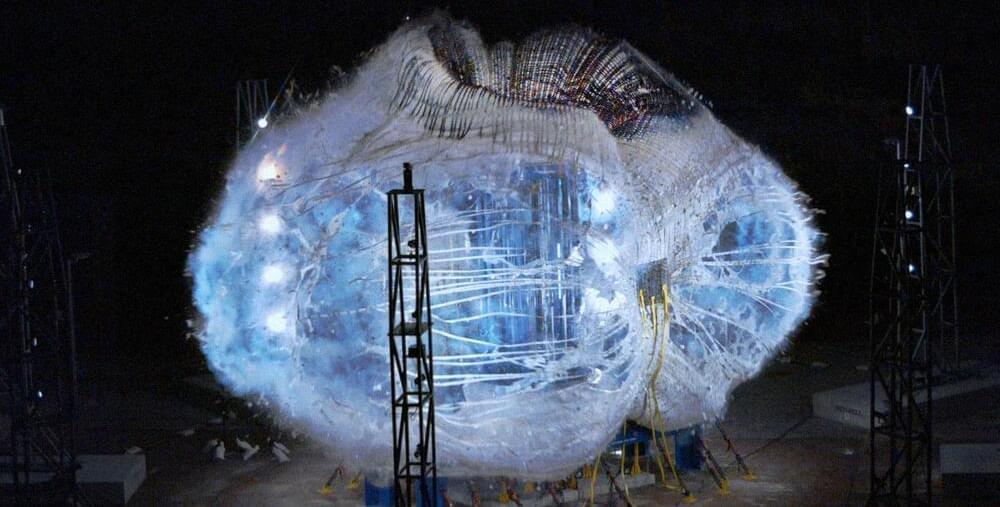Mar 20, 2024
Nvidia CEO Jensen Huang announces new AI chips: ‘We need bigger GPUs’
Posted by Kelvin Dafiaghor in category: robotics/AI
Nvidia on Monday announced a new generation of artificial intelligence chips and software for running AI models.
Nvidia on Monday announced a new generation of artificial intelligence chips and software for running AI models.

From abstract-looking cloud formations to roars of snow machines on ski slopes, the transformation of liquid water into solid ice touches many facets of life. Water’s freezing point is generally accepted to be 32 degrees Fahrenheit. But that is due to ice nucleation—impurities in everyday water raise its freezing point to this temperature. Now, researchers unveil a theoretical model that shows how specific structural details on surfaces can influence water’s freezing point.
Mike Dougherty American Heart Association Epidemiology and Prevention|Lifestyle and Cardiometabolic Health Scientific Sessions 2024, Abstract P192.
03/19/24 Editor’s note:

Private space company Sierra Space has blown up its first full-scale inflatable space habitat, dubbed the Large Integrated Flexible Environment (LIFE) — and it was all part of the plan.
The balloon-like contraption, which measured just over 20 feet tall, held a third of the volume of the International Space Station once fully inflated. During a recent test, engineers at the Colorado-based company kept pumping it with air, reaching a whopping 77 psi — well above NASA’s recommended level of 60.8 psi — before it exploded in spectacular fashion.
Continue reading “Full-Scale Prototype Space Habitat Explodes Under Pressure” »
Chinese scientists are working on a giant electromagnetic launch track to launch a massive 50-ton spaceplane — longer than a Boeing 737 — into orbit.
As the South China Morning Post reports, the “giant rail gun” system is designed to accelerate a hypersonic aircraft to speeds of up to Mach 1.6. Once it reaches the end of the track, its engine then accelerates it to the edge of space at seven times the speed of sound.
If actually built, it could greatly cut down on the amount of fuel such a craft would need to get to space, allowing it to carry bigger payloads — and save a considerable amount of money as well.
A recent study explored a potential connection between obstructive sleep apnea (OSA) and bladder pain syndrome/interstitial cystitis (BPS/IC) in women. The findings published in the Sleep and Breathing Journal underline the importance of understanding the interplay between sleep disorders and urological conditions.
This study investigated the frequency of BPS/IC in women diagnosed with OSA when compared to those without OSA. A total of 92 women participated, where 46 were diagnosed with OSA and an equal number serving as the control group. Various assessments including the Berlin Questionnaire, Epworth Sleepiness Scale, Interstitial Cystitis Symptom Index (ICSI) and Interstitial Cystitis Problem Index (ICPI) were evaluated in all participants.
The results revealed that women with OSA expressed higher scores on the Epworth Sleepiness Scale which indicates increased daytime sleepiness, while there were no significant differences in age and body mass index between the two groups. Also, the measures of BPS/IC symptoms (ICSI) and associated daily life disruptions (ICPI) were significantly increased in the OSA group when compared to controls.
New research presented early ahead of this year’s European Congress of Clinical Microbiology and Infectious Diseases (ECCMID 2024, Barcelona, 27–30 April) from a team of researchers in the Netherlands shows how the latest CRISPR-Cas gene editing technology can be used to eliminate all traces of the HIV virus from infected cells in the laboratory, raising hopes of a cure.

PBS Member Stations rely on viewers like you. To support your local station, go to: http://to.pbs.org/DonateSPACE
Sign Up on Patreon to get access to the Space Time Discord!
/ pbsspacetime.
Continue reading “EMP Attack: The Real Science of Electromagnetic Pulse” »
Thanks to a significant scientific breakthrough in detection methods, conducting secret underground nuclear tests could become obsolete.
A team of Earth scientists and statisticians say they can now tell with 99 percent accuracy if such an explosion has taken place. This is up from 82 percent and is based on a dataset of known tests in the US, according to the new study published in Geophysical Journal International. It has previously been tricky to differentiate between nuclear explosions and other seismic sources, such as naturally-occurring earthquakes or man-made noise above ground.
“The explosion goes off and you have all this energy that radiates out, which can be measured on seismometers,” said lead author Dr. Mark Hoggard, of The Australian National University (ANU). “So, the science problem becomes how do we tell the difference between that and a naturally-occurring earthquake?”
Scientists around the world work hard to rinse quantum systems for noise, which may disturb the function of tomorrow’s powerful quantum computers. Researchers from the Niels Bohr Institute (NBI) have found a way to use noise to process quantum information. This raises the performance of the quantum computing unit, the qubit.
An international collaboration led by scientists at the Niels Bohr Institute (NBI), University of Copenhagen, has demonstrated an alternative approach. Their method allows to use noise to process quantum information. As a result, the performance of the fundamental quantum computing unit of information, the qubit, is increased by 700 percent.
The results were published recently in the journal Nature Communications.
